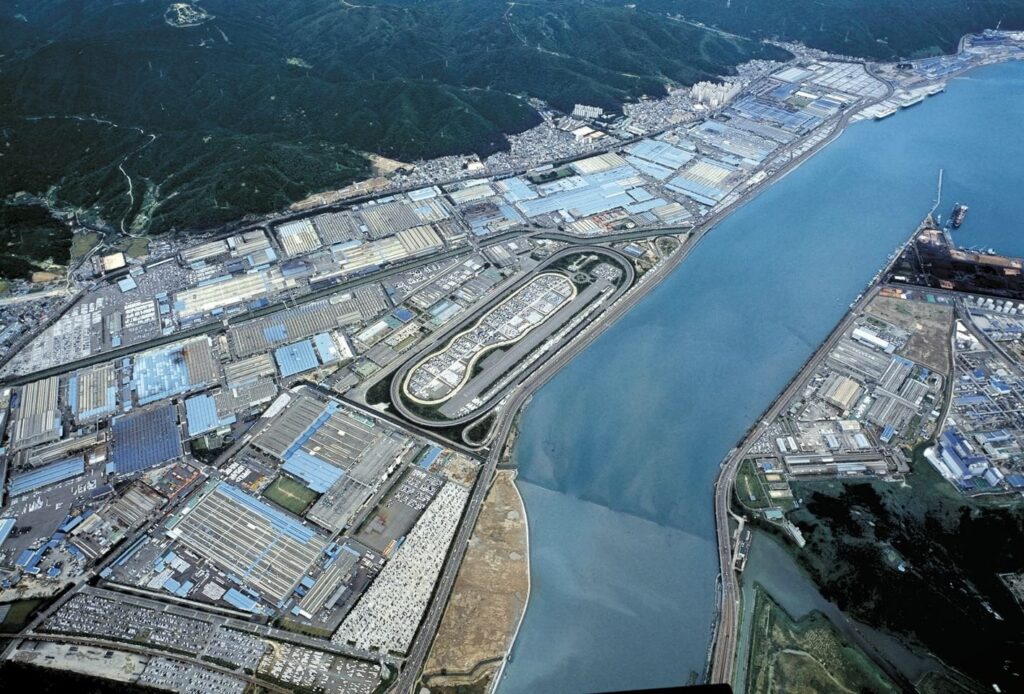Amid the rolling industrial landscapes of southeastern South Korea lies an automotive marvel that has become a global benchmark for manufacturing scale, efficiency, and innovation, the Hyundai Ulsan Plant. Known as the world’s largest single automobile manufacturing complex, this facility is not just a factory but an entire city devoted to the art and science of car production. Producing a finished vehicle every 12 seconds, the Ulsan Plant exemplifies precision engineering, vertical integration, and a relentless commitment to quality that fuels Hyundai Motor Company’s rise as a global automotive powerhouse.
The Genesis of a Giant
The story of the Ulsan Plant began humbly in the late 1960s amidst the post-war industrialization surge in South Korea. Originally established in 1968 as a small Ford assembly plant on reclaimed land in Ulsan’s industrial zone, Hyundai Motor Company nurtured it into a sprawling, purpose-built automotive production hub. This audacious vision reflected the founding spirit of Hyundai ambitious, resilient, and forward-thinking—aiming to transform South Korea from a war-ravaged country into a leading industrial nation.
Today, the sprawling 5 million square meters (about 1,200 acres, comparable to an entire small town) is a self-sufficient industrial ecosystem housing five independent vehicle assembly plants, along with dedicated engine, transmission, and seat manufacturing facilities. This vertical integration allows Hyundai to maintain stringent quality controls and efficiency across the entire production process under one roof, from raw materials to finished vehicles ready to ship worldwide.
Unmatched Scale and Output
The sheer size and output capacity of the Ulsan Plant set it apart in the global automotive landscape. With over 34,000 employees working on site and an annual production exceeding 1.5 million vehicles, it churns out approximately 6,000 cars daily, making it the most productive automobile manufacturing facility on the planet.
The plant efficiently manufactures a wide variety of Hyundai and Genesis models, including popular SUVs like the Hyundai Santa Fe and Tucson, sedans such as the Elantra, and cutting-edge electric vehicles like the Ioniq series. Hyundai’s commitment to electrification is also reflected in plans for a dedicated EV manufacturing plant within the complex, further demonstrating adaptability in an evolving global market focused on sustainability.
Precision at Industrial Scale
One of the most remarkable features of the Ulsan Plant is its production rhythm—completing a fully assembled vehicle every 12 seconds. This pace is not achieved by mere speed but through meticulous planning, automation, and human expertise working in concert.
The plant employs extensive robotics in welding and assembly, advanced paint shops using eco-friendly water-soluble paints, and modular assembly processes that enable parts and subassemblies to be prepared in parallel before final integration. This modular approach maximizes efficiency by reducing downtime and smoothing workflow bottlenecks.
Multiple quality control checkpoints are integrated throughout the production lines, ensuring that every vehicle meets Hyundai’s rigorous safety and performance standards. The plant also boasts its own proving ground for rigorous testing, certifying that every car leaving the factory is road-ready.
A Self-Contained Industrial City
The Ulsan Plant’s design reflects its immense scale, effectively functioning as a self-contained city dedicated to automotive manufacturing. It includes its own port facilities capable of anchoring three large 42,000-ton ships simultaneously, allowing Hyundai to seamlessly export vehicles worldwide without reliance on external shipping hubs. This integrated export capability offers a critical advantage in supply chain efficiency, facilitating global distribution to over 200 countries.
Supporting industrial infrastructure such as on-site fire stations, a hospital, security services, and shuttle transportation further underscores the facility’s magnitude. The plant represents not only a workplace but an ecosystem that supports thousands of employees and surrounding communities, reducing external dependencies.
Keystone of South Korea’s Industrial Development
For South Korea, the Ulsan Plant is more than just a manufacturing site; it is a symbol of the nation’s rapid technological advancement, innovation culture, and industrial prowess. Hyundai’s founding chairman, Ju-Yung Chung, famously encapsulated this vision: It won’t happen overnight; as the developed nations already boast long traditions and wide networks within their auto industries, there surely are markets around the world where our efforts can bear fruit.
Hyundai realized this dream by pioneering innovations such as Korea’s first mass-produced car—the Hyundai Pony—built at Ulsan in the 1970s. Through decades of investment in R&D and workforce development, Ulsan has become a focal point of national pride and a catalyst for the South Korean economy.
Sustainability and the Future of Mobility
As the industry pivots towards environmentally friendly vehicles, Ulsan is embracing a future driven by sustainability and innovation. Hyundai has established dedicated EV production lines within the plant, ensuring that the company remains competitive in the fast-growing electric vehicle market.
Moreover, Hyundai is investing in hydrogen fuel cell technology with plans to construct a hydrogen fuel cell manufacturing facility at Ulsan, targeting mass production by 2028. This effort is aligned with global decarbonization goals and Hyundai’s vision to expand hydrogen consumption significantly in the coming decades.
Eco-conscious manufacturing methods are also a hallmark of the Ulsan Plant—from using water-based paints to adopting energy-efficient processes—showing a commitment to reducing environmental impact even in large-scale industrial operations.
Innovation in Workforce and Automation
The workforce at Ulsan, numbering over 34,000 employees, is supported by cutting-edge technologies to enhance productivity, safety, and quality. The plant integrates advanced automation with skilled human labor, creating an optimized environment for precision manufacturing.
Robotic welding lines and automated guided vehicles are employed extensively to handle repetitive and heavy tasks, which improves efficiency and reduces workplace injuries. However, crucial decision-making and quality checks leverage human expertise, blending the best of both worlds.
Additionally, continuous improvement programs and a culture of innovation empower workers to participate actively in streamlining operations, fostering a dynamic and engaged workforce.
Strategic Global Export Hub
Ulsan’s location and infrastructure make it a strategic export hub. The on-site shipping port, owned by Hyundai Heavy Industries but crucial to Hyundai Motor operations, streamlines international logistics by reducing transit times and costs associated with vehicle export.
This arrangement ensures that vehicles manufactured at Ulsan can reach global markets rapidly, supporting Hyundai’s ambitions as a global car manufacturer. Approximately 75% of the factory’s production is shipped globally, demonstrating the facility’s vital role in Hyundai’s worldwide distribution network.
Conclusion
Hyundai’s Ulsan Plant is a masterpiece of industrial design, representing the pinnacle of modern automotive manufacturing at an unparalleled scale. Its combination of vast integrated facilities, precision production lines, sustainable practices, and forward-looking innovation makes it a defining symbol of 21st-century manufacturing.
From its origins as a modest assembly operation in a developing nation, Ulsan has evolved into a self-sufficient automotive city producing millions of vehicles that traverse the globe. As Hyundai pushes the boundaries of electric and hydrogen mobility, the Ulsan Plant stands ready to power the next chapter of automotive progress with the same spirit of ambition and efficiency that built it.
Every new Hyundai rolling off Ulsan’s assembly lines embodies not only a vehicle but a story of global industrial excellence, economic transformation, and the pursuit of Progress for Humanity.

